This past week, I watched the final episode of Angel Season 5, Not Fade Away. That’s right, after 12 combined seasons, 254 episodes, 180 or so hours and countless spells casts, swords swung, demons beheaded and vamps dusted, I’ve finally watched Buffy and Angel in their entirety.
I know I’m a bit late to the party on this one. Having only discovered Joss Whedon when I watched Firefly last summer, I’m just now realizing what many of you have known for years: Buffy and Angel are two of the best and smartest written shows of all time.
If you’ve listened to the podcast, you know that, despite the lateness of my discovery, I’m a huge Joss Whedon fan. So it goes without saying that I loved both shows. What should have been an absurd and cheesy premise, turned out to be brilliant, hilarious, deep, thoughtful and very moving.
But since I can’t just leave at that, I’ve decided to do a three part write-up sharing my thoughts on the Buffyverse. In part one, I’ll take a look at Buffy’s seven seasons, tracing the show’s evolution, discussing the characters and sharing some of my favorite moments. In part two, I’ll do the same for Angel. Finally, part three will focus on how Buffy and Angel stack up against the rest of Whedon’s canon, especially his other two TV shows, Firefly and Dollhouse.
Just to be clear, I’m looking at the shows only. I’m in the process of reading Angel: After the Fall, and I’m going to start Buffy Season 8 in the relatively near future. I’ll probably write something up on both graphic novel extensions when I finish them, but given the change in medium I feel the shows need to be judged alone.
So, without further ado, let’s get into Buffy.
Buffy Season 1
 Buffy’s first season is by far its weakest. In fact, it’s probably the weakest season out of all of Whedon’s series. That’s a bit unfortunate since there have likely been many people who gave up early and never stuck around to see how incredible the show became in season two and beyond.
Buffy’s first season is by far its weakest. In fact, it’s probably the weakest season out of all of Whedon’s series. That’s a bit unfortunate since there have likely been many people who gave up early and never stuck around to see how incredible the show became in season two and beyond.
The first season feels very dated, especially at first, and features several standalone episodes that only kind of work. Teacher’s Pet and The Pack are two that stand out as being particularly weak (though The Pack does have that wonderful/bizarre scene where the principle is eaten!)
Still, the season isn’t without merit. We’re introduced to our main trio and Giles quickly assumes his role as both mentor and father figure in Buffy’s life. Despite some of the weak storytelling, the first season also shows glimpses of Whedon’s uncanny ability to make a story brilliant that would otherwise be stupid. The Puppet Show was perfect example of this. I was bored for most of the episode. Evil, demonic puppets aren’t really that interesting to me. But then, Whedon turned the whole premise on its head. The puppet turns out to be a demon hunter instead of a demon. Throw in a bit of Whedon’s characteristic humor and what seemed like it would be a dud of an episode, turns out to be fantastic instead.
My hunch is that season one will be better on a second viewing. For a first time Buffy watcher, it may not be extremely enjoyable, but it’s worth sticking it out to get to the good stuff that lies beyond.
Rating: 3/5
Best Episode: Prophecy Girl – The season finale is when the show finally starts to take things to the next level. It’s a great episode and sets the tone for the next six seasons.
Buffy Season 2
 If season one is the weakest Buffy has to offer, things turn around in a hurry with season two. I go back and forth between this and season six for my favorite Buffy season. It’s a brilliant year for the show for many, many reasons, not the least of which is the characterization. Willow and Xander become much deeper and more important characters. Cordelia actually contributes something to the show and begins to show hints of the depth her character will have in later seasons.
If season one is the weakest Buffy has to offer, things turn around in a hurry with season two. I go back and forth between this and season six for my favorite Buffy season. It’s a brilliant year for the show for many, many reasons, not the least of which is the characterization. Willow and Xander become much deeper and more important characters. Cordelia actually contributes something to the show and begins to show hints of the depth her character will have in later seasons.
Then there’s the introduction of Spike, who is hands down my favorite character in the entire series. The episode where he’s introduced, School Hard, is fantastic and sets up the Spike/Angel rivalry that will continue for years. Even though he’s still a long ways from becoming the man he’ll eventually be in later years, his character arc in this season is fantastic, especially in the season finale, Becoming. I love his conversation with Buffy in that episode, not to mention the awkward, and hysterical, moment he and Joyce share in the Summers’ living room.
I’d be remiss if I didn’t also mention Drusilla. Juliet Landau’s performance is unbelievable. Equal parts evil, innocent and insane, Drusilla is a wonderful villain and the perfect companion for Spike.
But the highlight of season two is by far the Angelus storyline. Whedon takes one of the main heroes of the show and turns him evil. The courage and brilliance of that twist is incredible. I’ll be honest and admit that Angel isn’t my favorite character on the show, especially during his time on Buffy, but the show was never better than during the second half of season two. Even if the rest of the series had been horrible, that storyline alone is enough to make Buffy one of the greatest series ever made.
Rating: 5/5
Best Episode: Passion – Everything about this episode is perfect, especially the moment where Giles discovers Jenny. The sheer evil and cruelty of Angelus on display in this episode is absolutely chilling. This is the best episode not only of the season but also of the series as a whole.
Buffy Season 3
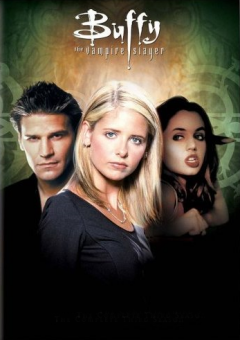 Season three is a bit weaker than its predecessor. I didn’t care much for the first couple episodes, especially the whole storyline of Buffy disappearing. The lack of Spike (with the exception of one brilliant episode) put a bit of a damper on the year. Also, Buffy and Angel’s relationship didn’t really work for me in this season. It seemed to me like a long exercise in drawing out the inevitable.
Season three is a bit weaker than its predecessor. I didn’t care much for the first couple episodes, especially the whole storyline of Buffy disappearing. The lack of Spike (with the exception of one brilliant episode) put a bit of a damper on the year. Also, Buffy and Angel’s relationship didn’t really work for me in this season. It seemed to me like a long exercise in drawing out the inevitable.
But none of that means the season was bad, not by a long shot! Season three brought us one of the show’s best villains in Mayor Wilkins. What makes the Mayor so terrifying is the fact that he’s actually a really great guy. He’s funny, charming, genuine and likeable. He steps into Faith’s life as the father figure she so desperately needs and he does so not to manipulate her but because he genuinely loves her. The only problem is that he’s also completely evil. The Mayor represents the corruption of everything that is good, right and desirable. Harry Groener’s performance is phenomenal. He steals every scene he’s in an helps take season three to the next level.
The Faith/Buffy dynamic is great as well, especially after Faith turns evil. I’m not as big a Faith fan as some, but I love the way that she challenges Buffy, simultaneously pushing her out of her comfort zone and showing her how important her boundaries are.
This season also features the introduction of Wesley Wyndam-Pryce. I’ll hold off on discussing him much for now, but he’s a great addition to the season. By being a foil for Giles, he helps elevate everyone’s favorite librarian and show how much he’s grown as a character over the past few years.
Season three ends with every high school graduate’s dream come true as Sunnydale High is blown to smithereens. It’s a great final moment that puts a cap not only on season three, but also on Buffy’s high school days.
Rating: 4.5/5
Best Episode: Enemies – I’m tempted to put Lover’s Walk as my favorite episode due to my love for Spike, but Enemies is really the emotional heart of the season. Faith vs. Buffy is a fantastic, emotionally charged fight that shows just how far our characters have come this year.
Buffy Season 4
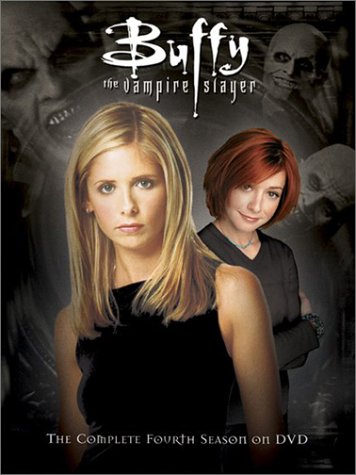 Season four is the point where Buffy fans seem to split. Some feel the show takes a huge step back once we leave the high school setting behind. Others, believe Buffy’s best days didn’t take place until after Sunnydale High met its timely demise. Although, I don’t think season four is quite as strong as seasons two and three, I’m definitely closer to the second camp.
Season four is the point where Buffy fans seem to split. Some feel the show takes a huge step back once we leave the high school setting behind. Others, believe Buffy’s best days didn’t take place until after Sunnydale High met its timely demise. Although, I don’t think season four is quite as strong as seasons two and three, I’m definitely closer to the second camp.
There were a couple of rough parts in the transition out of the high school setting, such as Giles being left unemployed. Though even that the show used in a good way to show the changing relationships between Giles and the Scoobies.
Season four also shook up the secondary characters a bit. Angel, Cordelia and Wesley all left for the spinoff, Oz stuck around for half a season and then departed to go find himself. Meanwhile, Anya gains a much more prominent role as her and Xander’s relationship really starts to take off. We also get Spike back, for good this time. His relationship with Harmony and newfound impotency (so to speak) are some of the best parts of the season.
All of those character changes are handled very well, but there are a couple that don’t work as much. First, there’s Tara. I’m not a huge fan of her character, especially in seasons four and five. It isn’t because of the homosexuality. Though I have my moral qualms with her and Willow’s relationship, Willow remains a great character both before and after her orientation changes, but Tara just doesn’t do much for me. I don’t dislike her, but she’s a bit of a weak link on the show, especially if you look at her as a replacement for Oz.
Then there’s Riley. I started out liking him ok but man did he get old fast. By the time he bid Sunnydale farewell in season five, I was more than ready for him to be gone. Riley’s not a terrible character, but he’s a bit one dimensional. On a show that’s famous for its colorful characters, Riley stands out as being a bit bland.
Along with him comes the Initiative and Adam, this season’s Big Bad. Both of them are similar to Riley in that they’re not terrible parts of the show, but compared to the villains of the other seasons they’re kind of bland.
None of that is to say this is a bad season. It isn’t. But it’s one of the weaker ones in Buffy’s run. Still, there’s a ton of great stuff here and I love that James Marsters finally gets his due and becomes a series regular.
Rating: 4/5
Best Episode: Hush – If the main storyline involving the Initiative is a bit boring in places, moments like Hush add more than enough spice to make up for it. Hush is a great, experimental episode that features no dialogue for over half of the running time. Whedon is famous for writing witty dialogue. In this episode he shows that that’s only one weapon in his arsenal. He’s a great all around writer. Hush should be ample evidence to disprove anyone who thinks otherwise.
Buffy Season 5
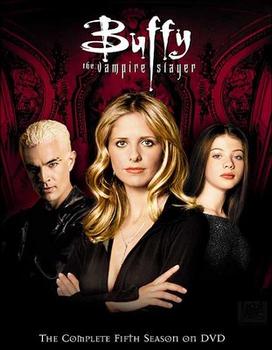 After a slightly weaker season four, season five is a big step in the right direction. I like that Giles is rescued from his painfully uncomfortable retirement and given control of the Magic Shop. This also gives the Scooby Gang a new home base, something that was very much missing in the previous year.
After a slightly weaker season four, season five is a big step in the right direction. I like that Giles is rescued from his painfully uncomfortable retirement and given control of the Magic Shop. This also gives the Scooby Gang a new home base, something that was very much missing in the previous year.
Season five features the arrival of Dawn who is a bit of a mixed bag. As a character Dawn can be really obnoxious. She has plenty of great moments to be sure, but she’s also prone to whining. A lot. The whole misunderstood teenager thing gets really old over the next two seasons. That said, I love how the show introduces her, or to be more accurate, doesn’t. The season begins and Buffy suddenly has a sister, a phenomenon everyone treats as normal. It isn’t until several episodes in that we’re given any sort of an explanation. It’s a brilliant move and I can’t imagine how wild the fan discussions must have been when this season began airing.
Season five also features Riley’s long awaited (and much appreciated) exit from Sunnydale. That clears the way for Spike and Buffy’s relationship to slowly begin to form. Not much comes of it this year, but it becomes one of the best parts of the final two seasons.
Glory is the big bad of season five. While she’s not the strongest villain in the show’s run, she’s a huge step up from Adam. The reveal that she and Ben are the same person is very well done. The one part of the main storyline that didn’t work well this season were the knights who sought to oppose Glory. Even for a show like Buffy, it seemed a bit farfetched that knights would be riding around California in full armor and on horseback, especially since they’re supposedly a secret society. Way to be inconspicuous.
The season ends with Buffy’s death. Her sacrifice is powerful and very well done. This could have easily been the series finale. It’s a great final moment for a great season.
Rating: 4.5/5
Best Episode: Family – A lot of people would list The Body as the high point of season five and it’s tough to argue with them. That episode is a phenomenal and realistic examination of grief unlike anything that’s ever been done on TV. But for me, Family comes out slightly ahead. I love the message of this episode, what it says about the importance of community and relationships. I find it ironic that while Joss Whedon is an atheist, he demonstrates in this episode that he understands the concept of The Church better than most Christians. Family is one of the most powerful and moving episodes of Buffy.
Buffy Season 6
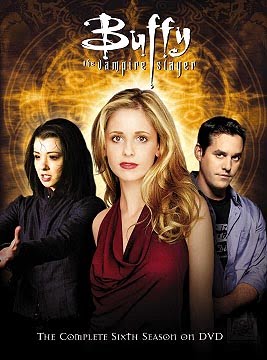 Season six is tied with season two as my favorite in the entire show. There’s a lot of stuff in this season that should be a weak point but isn’t. First, there’s the issue of bringing Buffy back from the dead. Normally, I hate it when stories do this. Characters should, for the most part, stay dead. I find it a cheap copout when stories weasel their way around what should be irreversible. Buffy’s resurrection is different for three reasons. First, it’s not a happy event. She’s in Heaven and her friends pull her out of it. Far from rescuing her from death, they’ve damned her with life. Second, it sets up the Dark Willow storyline. Finally, it serves as a powerful metaphor for the fact that life goes on, even when we’re ready to throw in the towel. It’s a very true and sobering message that’s shown again and again throughout the season.
Season six is tied with season two as my favorite in the entire show. There’s a lot of stuff in this season that should be a weak point but isn’t. First, there’s the issue of bringing Buffy back from the dead. Normally, I hate it when stories do this. Characters should, for the most part, stay dead. I find it a cheap copout when stories weasel their way around what should be irreversible. Buffy’s resurrection is different for three reasons. First, it’s not a happy event. She’s in Heaven and her friends pull her out of it. Far from rescuing her from death, they’ve damned her with life. Second, it sets up the Dark Willow storyline. Finally, it serves as a powerful metaphor for the fact that life goes on, even when we’re ready to throw in the towel. It’s a very true and sobering message that’s shown again and again throughout the season.
Another element that should be a weakness but mostly isn’t, is Giles being absent for much of the year. I hate Giles being gone. He’s one of my favorite characters. But his absence forces Buffy to grow up in a way she couldn’t otherwise. Whedon has said that season six is all about having to deal with the hardships of real life. Giles being gone forces Buffy to do exactly that and it’s part of what makes this season so great.
The main storyline of season six is phenomenal. The Trio gets a bit played out as the season goes on, but Jonathan, Andrew and Warren are fantastic for most of the season. Their chemistry is great and they’re consistently hysterical, lovingly poking fun at all of us nerds. But the main draw of the season six storyline is Dark Willow. It takes a long time to develop, a bit too long perhaps, but when Dark Willow finally shows up the season reaches a whole new level.
I love the moment the early flashes of Willow’s evil side, especially her early fight with Giles when he calls her a “rank amateur.” Speaking of Willow and Giles, the moment when he returns in Two To Go and takes her down in the Magic Shop is one of my favorite in the entire show.
The storyline, and season, come to a close with Whedon once again showing just how important true relationships are. Xanders confrontation with Willow may be a bit cheesy, but it’s also a wonderful moment that shows that no matter what our characters have been through, underneath it all they’re still people. At the end of the day, that’s always what makes Buffy so great. No matter what else happens on screen, when it comes down to it, the show is about people. Season six drives that message home unlike any other time in the show’s run.
Rating: 5/5
Best Episode: Once More With Feeling – I have to give Passion a slight edge over this one, but Once More With Feeling is definitely the second best episode in the series, and it’s a close second. Once again, Whedon takes a risk with an experimental episode and once again it pays off big time. This episode could have been a disaster, in fact, it probably should have been. But instead it works perfectly. The soundtrack is amazing (and well worth purchasing if you haven’t done so already). The episode is a perfect representation of the show as a whole, hysterical in places, powerful and moving in others.
Buffy Season 7
 After almost 3,000 words, we come to the final season of Buffy. Season seven is a bit of a mixed bag for me. It starts out very strong. I love that Spike now has a soul. I love that Anya is evil again (well, sort of anyway). I love the way the First Evil slowly manipulates our heroes. I also think the year ends very strong. Nathan Fillion is phenomenal as Caleb. Of course, I’d rather that he’d have been too busy filming Firefly episodes to participate in the final episodes of Buffy, but that’s another discussion for another time.
After almost 3,000 words, we come to the final season of Buffy. Season seven is a bit of a mixed bag for me. It starts out very strong. I love that Spike now has a soul. I love that Anya is evil again (well, sort of anyway). I love the way the First Evil slowly manipulates our heroes. I also think the year ends very strong. Nathan Fillion is phenomenal as Caleb. Of course, I’d rather that he’d have been too busy filming Firefly episodes to participate in the final episodes of Buffy, but that’s another discussion for another time.
It’s the middle of the season where I really have problems with. The potential slayers did not work for me at all, especially Kennedy, who earns the award for worst character on Buffy. Thankfully she’s only prominent for half a season, but man is she bad. She’s a bit like Faith but not as well acted or written.
The season also seems a bit unsure what to do with some of the characters. Andrew is back but spends most of the season doing little more than being yelled at. Anya turns good again, but then more or less fades into the background of an overcrowded season. I also didn’t care one bit for the ubervamps. Buffy is famous for having colorful, complex villains. These guys were neither and, as a result, weren’t very interesting to watch. Buffy’s motivational speeches also get old quickly, though at least the show has the good sense to poke fun at that.
Despite my many complaints about this season, there’s still a lot that works. In addition to what I mentioned at the beginning of this section, I also really enjoyed DB Woodside as Robin Wood. Perhaps my favorite element of the year though is the way this season sums up all the others by incorporating small elements from all of them. It’s a great touch and a nice way to wrap up the show.
One element I’m a bit mixed on is Spike’s sacrifice at the end of the season. It’s a great moment, but one that’s more or less negated by knowing he comes back in Angel season five. Unlike Buffy’s resurrection, Spike’s does feel a bit like a copout. Don’t get me wrong, I’m glad there’s more of Spike beyond this season, but it does make his sacrifice more or less meaningless.
Overall season seven shows that the show is ready to end. It’s still a very good year, but all good things must come to an end. Unlike other shows that drag on well past their prime, Buffy had the good sense to go out before it faded into absurdity.
Rating: 3.5/5
Best Episode: Selfless – Buffy’s showdown with Anya in this episode is incredible. I do think it would have been slightly better if Anya had died here, especially since she doesn’t do much the rest of the year, but that doesn’t change how powerful the episode is. If there was ever any doubt about how seriously Buffy takes her calling, this episode clears it right up.
So that’s it! Seven episodes of Buffy the Vampire Slayer summed up in one very long blog post. I’ll be back in a couple days with part two of this series where I’ll be taking a look at all five seasons of Angel.

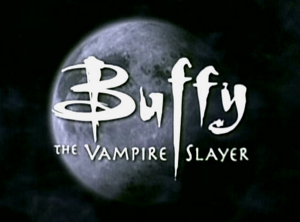
Ben, great first part in your 3-part Buffy/Angel retrospection! I am so thankful you are writing about this and I kind of wish I had the idea first =) With that being said, I’d like to share a few of my agreements and disagreements.
I watched both Buffy and Angel when they were on television. To this day, Buffy remains my favorite show of all time, for many of the reasons you mention in the above post. Over the past two years, I have been re-watching Joss Whedon’s shows with my wife as she had never watched any of them. We started off with Angel (which I am sure I will comment about after your next post), followed by Dollhouse, and now Buffy. We just finished up season six of Buffy so I won’t comment much on your reaction to season seven until I am finished watching it again.
I completely agree with you that season one is the weekest link in the series. Not that it is a bad show, but it is very cheesy and the fact that every bad thing that happens to the characters or side characters in each episode occurs in the locker room (not too original).
After watching season two again (considering it had been about 13 years since I originally watched it) has become, like it has for you, arguably one of my favorite seasons. The chemistry between Sarah Michelle Gellar and David Boreanez throughout the season remains strong, and I think, grows stronger in the second half. And man, Angel makes an excellent bad guy.
I don’t have much to say about seasons three, four, and five other than that I agree with almost everything your said. Season six, however, is where we differ. I don’t think that it was a bad season, by no means. I do believe that it was not the strongest season. I understand the whole idea behind Joss’s thinking, forcing the characters to deal with real life and grow up. I also think the idea of having practically every character come to their breaking points and then find redemption is a brilliant move on Joss Whedon’s part that truly magnifies our thinking from a biblical perspective. My issue with the season is that all of these things lasted way too long. Buffy and Willow were depressed for about three quarters of the season making it hard to like them at all. No one was communicating, leaving every relationship on the show strained for almost the entire season. And for a show that mixes great characterization and storytelling with a lot of fight scenes, I don’t think there was enough of the latter to go around. I think that the final three episodes of the season really put the rest of the season into perspective and helped me to appreciate it as a whole. I remembered season six to be my least favorite season when I first watched it in 2001/2002. I wouldn’t rate it that low anymore but it is certainly not my favorite. I would definitely put it above season 1 and 4 though.
Anyway, again, great job and I can’t wait to read your next post!
I can see what you mean with season 6, but I think all the seasons had similar issues. Even season 2 had filler episodes like Go Fish and Ted. To me, it goes back to the discussion we’ve had on the podcast about shorter tv seasons. Even a great show like Buffy would have benefited from a bit tighter storytelling.
I think part of what made the difference for me is watching it on dvd as opposed to while it was being broadcast. Episodes that don’t advance the plot much are much more annoying when you have to wait a week to see what happens next!
Yeah, you make a good point. At first when you and Matt started talking about having shorter seasons, I disagreed. However, I have been watching Dr. Who a lot recently and some other shows like The Walking Dead make me think that it might not be such a bad idea.
By the way, Go Fish is by far the WORST episode of Buffy ever! Sarah and I always joke about it being our favorite.
Two words: GO FISH.